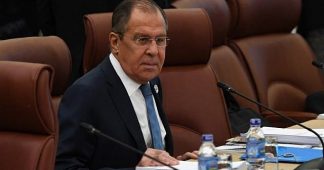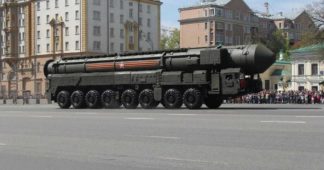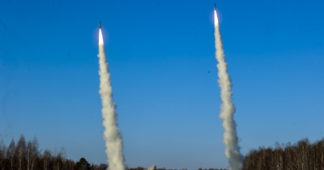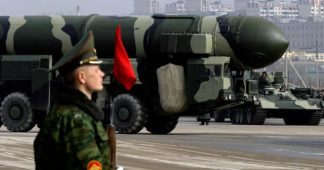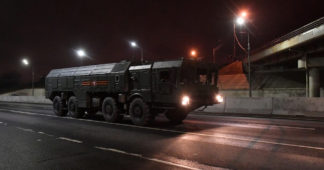Jun 22, 2023
Originally posted on RT, June 17, 2023.
Response of Professor Alexey Makarkin, Vice-President of the Center for Political Technologies:
Professor Sergey Karaganov’s “Tough-but-necessary decision” article – which claims that by using its nuclear weapons, Russia could save humanity from a global catastrophe – has provoked plenty of reaction domestically.
Some saw it only as the private opinion of a political scientist. Others pointed out that Karaganov is no stranger to high office: he is aligned with the Security Council of the Russian Federation, among other bodies.
Karaganov’s article about a nuclear strike is completely unsurprising. Last September he did not rule out “the need to use nuclear weapons” and predicted that the US would not sacrifice Boston for Poznan. The signals were clear. There were just two differences. First, a nuclear strike has been transformed from a possibility into a concrete short-term goal, if the West doesn’t back off – which is what has raised the profile of the news piece. And, secondly, it concludes that the advent of nuclear weapons is the result of a direct intervention of the Almighty, who has decided through fear to keep the world from new wars. It seems that even the American apologists for the Cold War never thought of such a theological argument.
The text by Karaganov illustrates the desperation to which deadlocked realpolitik can lead us. Three decades ago, a considerable number of Russian Westernizers dreamed of a kind of new Entente ruling the world – with Moscow’s participation, of course. Russia’s modernization at the time was accompanied by an archaic desire to restore “the Russia we lost” – not the real Russian empire, but an imagined and reconstructed version, including elements of the old Soviet superpower. But there was a consensus among such Westernizers and anti-Western figures that there would be no recognition of an independent role for the “small countries,” which were perceived only as a playground for the great game of the few great powers.
When the Entente failed, a new Yalta was conceived, not to negotiate with our partners but to impose the rules of the game on our opponents. And now Karaganov’s text testifies to its author’s despair at the fact that the Entente has been rejected and the Yalta scheme has not only failed but cannot be achieved by conventional means.
Response of Sergey Poletaev, co-founder and editor of the Vatfor project:
Professor Karaganov suggests that we should stop hesitating and finally strike. Start with Poland and then see how it goes. And after that [the West] will leave us alone and we will live happily ever after. If they do, that’ll be great. And if not? Then our actions will very quickly lead to the very destruction of humanity that the professor is trying to avoid.
That is the first thing.
Second: Our main achievement since the beginning of the military operation in Ukraine is that most of the world has recognized that we are acting within our our rights: Whether openly, like China, or silently or because they, by and large, do not care [about a conflict in Europe].
This is what gives us a chance not just to live but to even develop and prosper in the face of the new normal.
There is no need to put this achievement in danger by starting a nuclear war, especially as we are doing quite well in a conventional conflict so far. The atomic option should still be retained in case of a NATO conventional attack on the Kaliningrad region, Belarus and so on, and we should not hesitate to use them there.
That said, a public nuclear test would be useful. On Novaya Zemlya [an island in the Arctic], with broadcasts and streaming in 5D. The other nuclear powers would probably follow suit, and the rest of the world would be wondering who’s who in this conflict and where it might all lead.
Response of Philosopher Alexander Dugin:
I think this is an extreme proposal. We are far from having exhausted all the possibilities of victory without nuclear weapons, but I certainly understand, as our president has said, that there will be no peace at all without Russia. That has to be taken seriously. But with our current resources, it is irresponsible to talk in advance about a nuclear apocalypse.
People like Karaganov [are curious]: one day they are glorifying Western civilization, in his case for decades, but the next they become extreme Russian patriots. They go full-on in both personas, and they don’t show consistency. We have not exhausted all the possibilities of talking about nuclear weapons, but we must not forget what use would mean. Everyone should understand that it would be the last resort.
Response of Elena Panina, former State Duma deputy and director of the Institute of International Political and Economic Strategies:
Sergey Karaganov’s article suggesting Russia should preemptively use nuclear weapons is intended to finally draw “red lines” so that the West gets scared and retreats. However, it looks like an extremely strange gambit, even beyond the provocative overtones. Nuclear war as a remedy for a global catastrophe is as helpful as a guillotine for a headache.
It is nuclear war that we are talking about, though in Karaganov’s article the term is replaced by the more streamlined formula “use of nuclear weapons.” Is there a line before which “use of nuclear weapons” is not nuclear war, and after which it is?
Is it not clear that the first use of nuclear weapons will immediately trigger a retaliation of much greater force?
Nuclear weapons are the last resort on the chessboard. When all other means have been exhausted, all resources expended, and defeat is inevitable. And even then, nuclear weapons can no longer be used to checkmate the enemy, but instead to overturn the tables and blow up the room. They do not let the enemy win by destroying it along with planet Earth.
The West has been blackmailing Russia by developing plans for a nuclear strike to which we would not be able to respond. And this absolutely is blackmail. As long as our chances are equal, no one will use nuclear weapons against us. We are guided by the same logic. That is why nuclear weapons are a deterrent. They have a purpose by the mere fact of their existence, not by their use.
Police officers and criminals both know the rule: don’t show your gun unless you intend to use it. Don’t scare your opponent with it, because they might hit you or shoot you first. That’s why immature minds are not advised to carry guns – they don’t control the guns, the guns control them. It is a good thing that Mr. Karaganov, who advises the use of nuclear weapons to scare the West, is not allowed to use them. And those who are allowed to have iron self-control and will not listen to such advice.
One gets the impression that Karaganov believes that the West can be stopped by a local and demonstrative “use of nuclear weapons”. But there is no comprehension of the consequences. And it’s not just the military but also the geopolitical component that is at stake. All those who are neutral or sympathetic to Russia today will turn their backs. The West is very much in favor of such Russian behavior. So why does the author suggest doing what is in the West’s interest?
Russia is responding to a war unleashed against it with conventional weapons, and it must win it with these very means. Our capacity is by no means exhausted, and it has not even really been used. The number of Russian troops on the lines of contact has not been increased dramatically, which should be necessary and possible, in my view, and not only through conscription. The fifth column in and around power has not been cleared. Can these things be compensated-for by using nuclear weapons to deter the West? Doesn’t this look like a bluff combined with madness?
Believing that it had won the Cold War, the West systematically worked to destroy Russia, and this has nothing directly to do with the US conflict with China, which just happens to coincide in the sense of time.
Would the US have started a war with Russia on Ukrainian territory if it had kept China as a vassal? It would have. The roots of the war lie in 1991, in the collapse of the USSR and the submission of the Russian elite to Western concepts.
The US and NATO are pumping equipment and ammunition into Europe. They are increasing their involvement in Ukraine. They desperately need a move by Russia to isolate it on the world stage.
And then, like an egg delivered on Easter Sunday, comes Sergey Karaganov’s article. Coincidence or part of a pattern?
Response of Political scientist Ilya Grashchenkov, President of the Center for Regional Policy Development:
Karaganov’s article is interesting because it shines a light on the impasse in which we find ourselves. Without reflecting on why this has happened, he suggests a simple solution: “It is necessary to scare the West into retreating and getting out of the way. To do this, we must strike. Somewhere. It’s not yet clear where.”
“It is a morally frightening choice – we use God’s weapon and condemn ourselves to a severe spiritual dilemma. But if we do not, not only will Russia perish, but all human civilization will probably come to an end,” is the conclusion Karaganov draws for some reason.
And what would our reaction be if (God forbid!) Pakistan attacked India or vice versa? We’d be horrified. Shocked that the nuclear taboo has been breached. Then we’d help the victims and change our own doctrine accordingly.
In fact, Karaganov’s article is similar to the line of thought of [ex-Preident Dmitry] Medvedev’s, but more serious. It is also in the schoolboy logic of “hitting first” and thereby beating the opponent in a berserk frenzy. Which is kind of frightening.
On the other hand, if you talk about something for a very long time, you begin to perceive the idea not as insane but as quite acceptable. Thus extending the boundaries of what is possible, first in your own mind and then in reality. So, what goes on in the heads of those who write about “God’s weapon” (though personally I am not sure that God has any weapon at all and apparently they have their own Savior), is difficult to analyze and predict. Great Chinese prose compares such thoughts to “the dream of a severed head,” whose thoughts brew in a highly autonomous manner and are almost not subject to external comprehension. I would suggest that someone is trying to plant their fear in the West, fear as a new doctrine. We are the fearful!
To simplify the content of the article, it says that a “small scale” nuclear war is not that scary. And since we have nothing else, it means we have no choice – we must strike at Western Europe and then “in a few years take a stand behind China’s back, just as it is now behind ours, supporting it in its tussle with the US. For some reason, Karaganov seems to think that such an outcome is an outright blessing and a sign of prosperity, though one might perceive that such a position of battering ram and satellite of China looks rather humiliating.
We remind our readers that publication of articles on our site does not mean that we agree with what is written. Our policy is to publish anything which we consider of interest, so as to assist our readers in forming their opinions. Sometimes we even publish articles with which we totally disagree, since we believe it is important for our readers to be informed on as wide a spectrum of views as possible.
